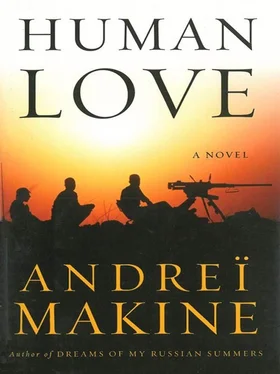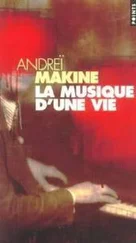It was the fountain pen I had tried to steal from him. This pen would travel through twenty-five years of journeying and oblivion, would several times be confiscated, along with other personal possessions. But I would always succeed in recovering it.
It is with Elias Almeida’s old fountain pen that I am currently writing these notes.
THE BIRD HE HAD BEEN CARING FOR managed to stay aloft, that day, then tumbled down awkwardly He picked it up and saw in the creature’s eye a reflection of the apprehensive joy he felt himself: soon this ball of feathers will go soaring up into the sky!
In 1961 he was eleven. The uprising against the Portuguese had just been crushed. Did he understand what that meant? Did he know that villages had been burned with napalm and that the Americans had supplied the bombers? That impaled human heads were becoming mummified along the roadsides? That to reward the victorious army they had opened brothels into which young Angolan women were crammed, as in a cattle market?
At the age of eleven does one know about or understand, and above all does one want to understand, such adult antics? Elias no longer remembered if the horrors of 1961 had been known to him at the time or recounted to him later by his fathers friends. He remembered the bird and its first, hesitant flight.
At all events he knew that his father had fled to the Congo to fight alongside Lumumba, a black man who talked on equal terms with white men. He knew that his father was a hero because he wanted to liberate the contratados , the prisoners packed together in trucks covered in wire mesh, on roads scorched by the sun. His father fought so that black people should be able to come freely into the cities where the whites lived, like this city of Dondo, where Elias’s mother went to work, leaving at nightfall. After his father left they too had fled from the capital, Luanda, and after long wanderings had ended up in this rotten cluster of shacks on the banks of the Cuanza, at the edge of the whites’ city.
His father was dedicated to the happiness of the people. Elias had heard this from the mouths of men who used to visit their home before the uprising. Less clear was the amount of unhappiness that this great future happiness brought with it. The corpses of Angolans left in the streets by the soldiers. His fathers flight. And one night this sobbing, the tears of his mother, she who was so strong and cheerful that he believed her incapable of weeping. The hard work in the textile warehouse where she sorted coupons – that was what she had told him. But one evening she came home earlier than usual, sat down on the threshold of their hut, and looked at her son as if he were an adult. Tve had enough of those white boozers, their drink, their bad teeth… she murmured, and at once, as if to correct herself, began talking about the days long ago on the island of Cazenga when she used to wait for the fishermen s return. Elias sensed a fault line of untruth in these happy recollections but could not detect what was wrong. His mother was a simple fisherman s daughter, he thought, and his father a man who could read and write and whose features were so fine that people used to think he was of mixed race. Perhaps that could explain it all. His father was fighting for the happiness of the people, and his mother was this people, ignorant and fearful… Elias felt an urgent longing to be among his fathers companions in arms, far away from this hovel with its smell of stagnant water.
… Years later, having become a “professional revolutionary,” in the ideological jargon of the time, he would recall that moment when for the first time he had despised the people, with all the arrogance of one who seeks to build a paradise on earth for that very people. And he would reflect that all dictatorships are born of this lofty disdain.
But that evening at Dondo he was too young to be aware of it. Scraps of discordant notions jostled in his head: the flaw of untruth his mothers words had betrayed, the future happiness that demanded so many sacrifices, the time before the uprising, rather a gentle time (as he unwillingly recognized) in their house at Luanda… And that baker, a white man, who had one day given him a little bread roll sprinkled with poppy seeds. Elias did not want to count him among all those Portuguese who, according to his father, must be driven out or killed. And his mothers voice, too, now humming the lament generally sung by the contmtados caged in their trucks. How to unravel all that?
He squatted down and hid his face in a place where all this world of confusion ceased to exist, in the warm, tender crook of his mothers arm. Life flowed on drowsily there, lulled by the pulsing of the blood, an utterly different life, without the grimaces of the dead by the roadsides, without untruth. In the smooth warmth of this arm a scented night reigned that enveloped him completely, his face, his body, his fears. He half opened his eyes and his eyelashes caressed his mothers skin and the folded arm shivered slightly beneath this caress. Happiness like this was simple and needed no explanation, like the coolness that arose from the Cuanza, like the long scattering of stars above the house. Elias sensed on his lips the phrases that would speak of this happiness and the love his face found in the sweetness of the crook of this arm, but words seemed pointless. Nothing expressed the joy of that moment better than the tiny stirrings of the bird hidden inside his shirt. Its wings moved softly, tickling him, and from time to time he could feel the minute staccato of its beak against his chest.
Two days later he was already having to run to keep up with his birds flight. When he stopped, breathless, the bird landed too, then hopped toward him, nestling against his feet. Then he noticed they had crossed the frontier to the whites’ city This alarmed and also amused him: what mad freedom for that frail pair of wings! They would soon be soaring over the forbidden city, even over the river, beating the air of another country, the Congo perhaps… Whereas in his case, a few more steps could cost him his life. The patrols shot first and asked questions afterward, especially at nightfall.
To avoid them, he followed the course of the Cuanza and at one moment had to make his way around a long building resting on piles driven into the sand of the river bank. Portuguese voices, harsh laughter mingled with the clatter of frying pans, the fierce hissing of oil on overheated metal. The smell of fried fish awoke his hunger. Behind open windows men were eating, draining glasses of dark liquid, calling out to one another, picking their teeth. Mainly white, a few of mixed race, almost all dressed in uniform. Some of them in the company of black women who chuckled and licked fingers glistening with fat, adjusted their hair. There was not a single white woman.
Suddenly Elias saw his mother.
The man sitting next to her was a rather small and ugly Portuguese soldier. And this was incomprehensible, for whites are by nature handsome, elegant, and incomparably superior to blacks. Elias had never doubted this, as one does not doubt the brilliance of the sun, the currents in rivers. But now the ugliness of this man in his cups was plain for all to see: a crumpled uniform on a squat body, shapeless lips now pressed against the dirty glass, then stretched out into a smile, into a gabble of words… And his mothers smile that made her unrecognizable. Ugly… And the man s fingers, short, fleshy, gripping his mothers elbow, that thumb thrust into the crook of her arm!
The bird, nestled inside his shirt, suddenly escaped, flitting between the piles that supported the building, settled, hidden behind a bush. Elias ran off in hot pursuit amid this petrified forest of timbers covered in algae, stumbled, grazed his forehead against a beam. In the darkness it seemed as if the bird were spying on him, teasing him. He heard its chirruping, moved forward, stooping, then flung himself toward a black ball that was detaching itself from one of the piles. His hands seized it and at once let go in disgust. It was a dead pigeon, half eaten by rats. He began running again, slithering on heaps offish scales, on swathes of rubbish. The piles surrounded him, closed in on him, barred his way. He fell and, as he got up, became aware that he was floundering in the waters of the Cuanza, with his feet slowly sinking into the slime. He also realized that he was no longer trying to catch his bird, for the creature had already returned and was obediently perched on his shoulder. No, in his breathless flight he had been trying to reach the row of windows that extended out over the riverbank on a wooden platform. That window, over there, whose support he reached, tugging his feet out of the clay A moment ago he had seen his mother and the soldier get up from the table, leave the main room, go out onto the balcony. Then a window had lit up…
Читать дальше









